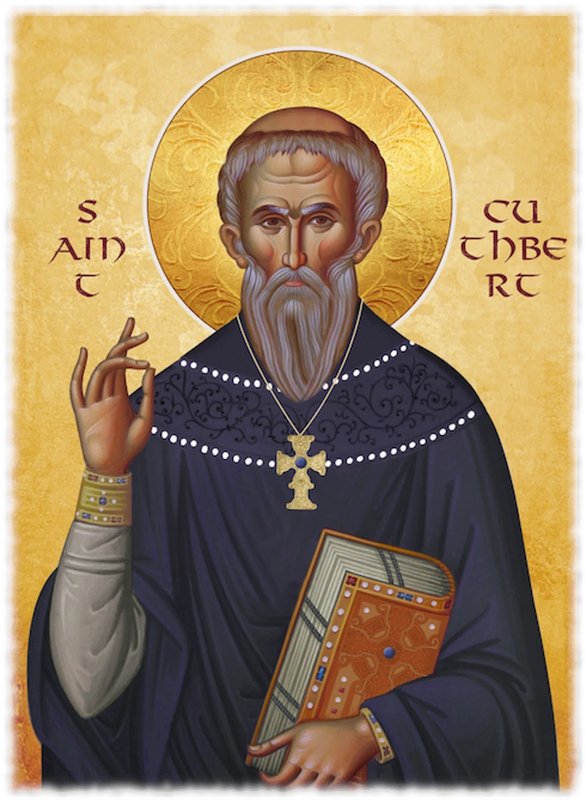 |
L'Eglise Aristotelicienne Romaine The Roman and Aristotelic Church
Forum RP de l'Eglise Aristotelicienne du jeu en ligne RR
Forum RP for the Aristotelic Church of the RK online game
 
|
| Voir le sujet précédent :: Voir le sujet suivant |
| Do you approve of the hagiography of Saint Cuthbert presented by the Cenacle of Theologians? |
| Yes |
|
100% |
[ 5 ] |
| No |
|
0% |
[ 0 ] |
| Abstention |
|
0% |
[ 0 ] |
|
| Total des votes : 5 |
|
| Auteur |
Message |
Francesco_maria
Cardinal

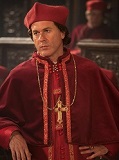
Inscrit le: 14 Jan 2013
Messages: 3908
|
 Posté le: Mar Aoû 13, 2024 10:17 am Sujet du message: [Vote] Hagiography of Saint Cuthbert Posté le: Mar Aoû 13, 2024 10:17 am Sujet du message: [Vote] Hagiography of Saint Cuthbert |
 |
|
"The time for debate on the proposed hagiography of Saint Cuthbert has passed. Now we proceed with the voting phase.
Here the debate.
I remind you that only the Eminent Cardinal Bishops and Cardinal Priests can vote. The vote will last for 5 days."
_________________
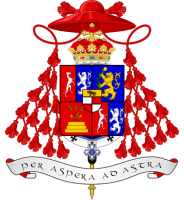 |
|
| Revenir en haut de page |
|
 |
Francesco_maria
Cardinal


Inscrit le: 14 Jan 2013
Messages: 3908
|
 Posté le: Mar Aoû 13, 2024 10:20 am Sujet du message: Posté le: Mar Aoû 13, 2024 10:20 am Sujet du message: |
 |
|

_________________
 |
|
| Revenir en haut de page |
|
 |
Ettore_Asburgo_D'Argovia
Cardinal

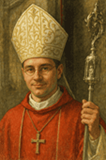
Inscrit le: 28 Nov 2018
Messages: 1751
Localisation: In viaggio
|
 Posté le: Mar Aoû 13, 2024 10:51 am Sujet du message: Posté le: Mar Aoû 13, 2024 10:51 am Sujet du message: |
 |
|

_________________
+ Ettore Asburgo D'Argovia
Cardinale-Presbitero di San Barnaba a Ripa
Decano del Tribunale della Rota Romana
Ufficiale dell'Ordine pontificio di Nicola V
 |
|
| Revenir en haut de page |
|
 |
pamelita
Cardinal


Inscrit le: 15 Oct 2013
Messages: 3867
Localisation: Ducato di Milano
|
 Posté le: Mar Aoû 13, 2024 4:00 pm Sujet du message: Posté le: Mar Aoû 13, 2024 4:00 pm Sujet du message: |
 |
|

_________________
 |
|
| Revenir en haut de page |
|
 |
Fenice
Cardinal

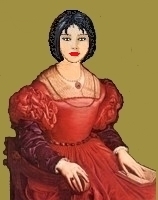
Inscrit le: 19 Déc 2010
Messages: 12333
|
 Posté le: Mar Aoû 13, 2024 10:19 pm Sujet du message: Posté le: Mar Aoû 13, 2024 10:19 pm Sujet du message: |
 |
|

_________________
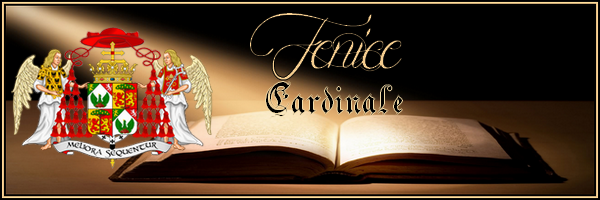 |
|
| Revenir en haut de page |
|
 |
Tymothé de Nivellus
Cardinal


Inscrit le: 22 Nov 2017
Messages: 6758
Localisation: Cardinal Camerlingue de Rome et Chancelier de la Chambre Apostolique
|
 Posté le: Lun Aoû 19, 2024 5:55 pm Sujet du message: Posté le: Lun Aoû 19, 2024 5:55 pm Sujet du message: |
 |
|
Yes, sorry for my retard!
_________________
 
Père Tymothé de Nivellus | Cardinal-Evêque de Saint Trufaldini à la Porte Latine | Camerlingue de Rome et Chancelier de la Chambre Apostolique | Archevêque SC d'Avignon et Archevêque d'Embrun
"La puissance de Dieu donne toute sa mesure dans la faiblesse"
Cabinet du Cardinal |
|
| Revenir en haut de page |
|
 |
Francesco_maria
Cardinal


Inscrit le: 14 Jan 2013
Messages: 3908
|
 Posté le: Mar Aoû 27, 2024 9:10 pm Sujet du message: Posté le: Mar Aoû 27, 2024 9:10 pm Sujet du message: |
 |
|
"The vote has long been concluded. The favorable opinion was expressed unanimously by the voters, therefore the hagiography is approved. The Holy Church rejoices for a new saint! Below is the official text with the image. Next Sunday, September 1st, it will be my honor to officially announce it to the faithful."
| Citation: | The Life and Miracles of Saint Cuthbert
619 - 681
Background
Born on March 7th 619, given the name Cuthbertus MacLachlan at that time in the village of Kirkcudbright. Kircudbright was at this time a sea harbor town with direct access to the Firth of Dee. This Hagiography describes the life or journey of Cuthbertus MacLachlan whose actions left a mark on Faith in Scotland, an inspiration to many. On March 26th 681, a little over 3 weeks after his 62nd birthday he passed away in his home in Kirkcudbright, surrounded by his friends and faithful villagers.
Early Life
Cuthbert, born in the 7th century, entered the world in the quaint town of Kirkcudbright. His birth is said to have occurred on the 7th of March, a day that would later be commemorated as a significant milestone in the life of this Scottish man. He was the second son of a humble family of farmers, the MacLachlan clan, known for their steadfast dedication to the land and their deep-rooted ties to the local community. Growing up in Kirkcudbright you could grow up to become a farmer or a fisherman, Cuthbert's childhood was filled with the simple joys of rural life. He spent his days exploring the lush countryside, his inquisitive nature leading him to uncover the hidden wonders of nature and the mysteries of the world around him. Amidst the idyllic backdrop of his upbringing, Cuthbert's youthful years were marked by a natural curiosity and a compassionate heart. It was during this time that he first came into contact with the Church in the parish of Kirkcudbright. A Deacon named Ealdred, known for his wisdom and devotion, became a source of inspiration for the young Cuthbert. Under Ealdred's guidance, Cuthbert's spiritual journey began to unfold, laying the foundation for his future dedication to a life of faith. These early encounters with the Church and the nurturing influence of Deacon Ealdred set the stage for the unfolding saga of Cuthbert's remarkable life. The seeds of piety and devotion sown during his upbringing would soon blossom into a legacy that would leave an indelible mark on the annals of Scottish Aristotelianism.
Call to Faith
At the age of 15, in the year 634, Cuthbert's journey of faith took a significant turn. Ealdred, recognizing the depth of Cuthbert's piety and the stirring of his soul, nurtured the young boy's burgeoning faith with care and compassion. He taught Cuthbert the sacred scriptures, instilling within him the virtues of humility, friendship, and faith to God. Deacon Ealdred sought and received permission from Cuthbert's parents to take him to the seminary in Rome, where he would commence his education. The journey from Kirkcudbright to Rome was an odyssey of discovery, filled with both physical and spiritual challenges. Traveling through the picturesque landscapes of England, Cuthbert and Ealdred encountered various communities, fostering bonds with fellow pilgrims and sharing the teachings of the Prophets Aristotle and Christos along the way. The crossing of the Dover Strait became a metaphorical threshold, symbolizing the transformative passage from Cuthbert's familiar homeland to the wider world of theological learning.
Upon arriving in Rome, Cuthbert immersed himself in the vibrant atmosphere of the seminary. One of his most influential teachers was the esteemed Italian Bishop Alessandro, known for his deep theological insights. Under Bishop Alessandro's guidance, Cuthbert delved into the intricacies of theology, philosophy, and scripture, absorbing the rich tapestry of knowledge that would later define his own teachings. Cuthbert's education in Rome was marked not only by intellectual growth but also by a profound spiritual maturation. His unwavering commitment to learning and his innate piety impressed both teachers and fellow students alike. Some Cardinals in Rome, recognizing the young and promising student, took note of Cuthbert's potential for future leadership within the Church. After years of diligent study and reflection, Cuthbert concluded his education in theology with a masterful understanding of The Dogma and the Canon Law. The journey back to Scotland became a triumphant return, as Cuthbert carried the wisdom and teachings acquired in Rome back to his homeland. His reputation as a learned theologian and devoted servant of God continued to grow, setting the stage for his future endeavors as a beacon of wisdom and faith in Scotland.
Monastic Life
At the age of 23, with the wisdom gained from his theological studies in Rome, Cuthbert, accompanied by his mentor Deacon Ealdred, made a profound entrance into monastic life by joining the serene enclave of the Benedictine Monastery of Kirkcudbright. The monastic walls provided a sacred canvas for Cuthbert to weave his theological insights into the fabric of daily prayer and contemplation. With the assistance of Deacon Ealdred, Cuthbert's influence within the monastery grew. His insightful teachings and exemplary devotion earned him the respect of both fellow monks and the esteemed Scottish bishop overseeing the Benedictine Monastery of Kirkcudbright. Within a short span of time, recognizing Cuthbert's remarkable qualities and deep spiritual insight, Bishop Aidan, the prelate of Saint Ninian's Cathedral, ordained him as a priest in a solemn ceremony held within the hallowed walls of the cathedral.
The ordination at Saint Ninian's Cathedral, attended by clergy and faithful alike, resonated with the sacred traditions of the Scottish Church. Bishop Aidan, known for his wisdom and benevolence, laid his hands upon Cuthbert, consecrating him to the priesthood and entrusting him with the divine responsibilities of guiding the faithful. After this ordination Cuthbert would walk every Sunday to the nearby Church of Kirckudbright to hold mass there. This was the way that he would never forget his hometown for what the people there did for him. On this journey he always walk with his staff in his hand, because the road was rocky. He would hold this mass throughout his life, even after his retirement for active service.
Tragedy struck the peaceful community when, within five years of Cuthbert's return, Deacon Ealdred, who started out as his inspirtion, then became his mentor and guide and after Cuthbert became priest remained at his side as his brother and companion, passed away. In the wake of Ealdred's departure, Cuthbert, now ordained by Bishop Aidan, assumed the role of ad interim head of the Monastery. His title, now elevated to Prior, reflected not only his academic prowess but also his commitment to preserving the sanctity and traditions of Kirkcudbright. As Prior, Cuthbert continued the spiritual legacy of his mentor, fostering an atmosphere of learning, devotion, and compassion within the monastery. The passing of Ealdred marked a solemn moment, but under Cuthbert's leadership, the Benedictine Monastery of Kirkcudbright flourished as a beacon of enlightenment and spiritual solace in medieval Scotland.
Missionary Work
Emboldened by his ordination and inspired by a divine calling, Cuthbert, now Prior of the Benedictine Kirkcudbright Monastery, received a sacred mission from the Cardinals in Rome: "to embark on a journey as a missionary in Scotland". His task was to spread the Aristotelian faith among those who still clung to the old ways, including the Picts and the Druids. So he picked up his staff, took some provisions and started his journey.
In one fateful encounter, Cuthbert found himself in a dense forest where the whispers of ancient rituals and the shadows of Druidic practices lingered. Among the towering trees, he encountered the highly respected Druid Lirion, cloaked in the mystique of the old traditions. Lirion had the reputation of being the most gifted Druid in Scotland at that time. When he spoke, the other Druids listened and in case of a dispute they turned to Lirion for advise. As their eyes met, Cuthbert sensed an unsettling presence – the unmistakable grip of the Nameless One, a malevolent force that sought to resist the encroaching light of Aristotelianism. With steadfast determination, Cuthbert engaged the Druid in conversation, seeking to understand the roots of his devotion to the ancient ways. As the dialogue unfolded, it became clear that the Nameless One held a sinister sway over the Druid's spirit. Cuthbert, guided by the divine grace within him, recognized the signs of possession. These signs where taught to Cuthbert while studying in Rome. Signs like speaking in unknown language, and the ability to see hidden things in the world around the Druid. That together with the relentless teasing that Lirion did during these conversations the two men had. It was very clear to Cuthbert, this man lead a sinful life, and had no control over the things he was doing. In a moment of divine intervention, Cuthbert, invoking the power of prayer while holding the wooden staff he always carried means of protection and confronted the Nameless One. A spiritual battle ensued, with Cuthbert's unwavering faith pitted against the malevolent force that had gripped the Druid's soul. The air crackled with energy as Cuthbert chanted sacred verses and called upon the divine protection bestowed upon him through his mission. In a crescendo of divine power, the Nameless One was expelled, leaving the Druid freed from the shadows that had ensnared him. The forest, once cloaked in an eerie stillness, now resonated with a newfound sense of peace. Lirion, now liberated from the dark forces that had held him captive, knelt before Cuthbert, recognizing the transformative power of the Universal and Roman-Aristotelian faith.
News of Cuthbert's encounter with the Druid and his triumphant deliverance from the Nameless One spread like wildfire, kindling the flames of belief among those who still clung to the ancient ways. Cuthbert, strengthened by this miraculous event, continued his missionary work with renewed vigor, dispelling darkness and ushering in the light of Aristotelianism to the farthest reaches of Scotland. Cuthbert's work as a missionary in the Highlands of Scotland lasted about seven years. In that time he encountered many people living the way of the druids and his was able to convert entire villages to the Church. Leaving behind baptised believers and in some cases even convinced people to walk the path of the Church and become deacons and even priests.
Miracles
The endless Fish Stew during a time of Famine
Long ago, in time when Deacon Ealdred was still alive and Cuthbert was still young the winter was harsher than ever. And to make things worse during early in the summer a plague of Cockchafer ate through the harvest, leaving less than ever before. This resulted in a scarcity of wheat, corn and grain. The fishermen of the village were unable to fill in the demand of extra fish. In the midst of this severe famine that gripped the Scottish village Kirkcudbright, Cuthbert responded with divine compassion. A group of hungry villagers, facing the brink of despair, gathered at the Church of Kirkcudbright, seeking sustenance. With the limited resoures that were available, Cuthbert himself made a fish stew from the remaining fish, the broth some left over potattos, onions and made to taste with herbs and spices. As Cuthbert began serving the fish stew to those present in the church, everyone looked in amazement at the large pan that was full. No matter how much stew Cuthbert handed out to those in the church, the pan remained full. As if the first scoop had yet to be taken out. That's how the people of Kirkcudbright survived those days of scarcity in the famine winter until the fishermen could get back out to sea to catch fish and the ships from Ireland arrived with grain.
Witnesses, including the venerable Deacon Ealdred, marveled as the meager provisions multiplied before their eyes, miraculously providing enough nourishment to satiate the entire community. Ealdred, known for his wisdom and understanding of the hardships faced by the villagers, bore witness to this extraordinary act of divine provision. The endless Fish Stew during a time of Famine became a symbol of hope during times of scarcity, solidifying Cuthbert's reputation as a compassionate conduit of divine abundance.
The Calming of a Furious Storm
Much later in time, when Cuthbert was running the Monastery of Kirkcudbright, there was a horrific storm at sea. The storm was so severe that the water overflowed from the river Dee into the streets of Kirkcudbright. Amidst a perilous sea voyage along the Scottish coast, a group of fishermen and sailors found themselves at the mercy of a ferocious storm. Waves crashed against their vessel, threatening to engulf it in the tempest's wrath. With their ship they managed to arrive at the firth in which the river Dee flows into, closing in on the harbor of Kirkcudbright. Desperate and fearing for their lives, the crew called upon Cuthbert for divine intervention. As the storm intensified, Cuthbert, at the Benedictine Monastery of Kirkcudbright, entered into a deep state of prayer.
Witnesses, including Bishop Aidan whom was at Withorn at that moment and even there the storm was wild, recount the miraculous moment when the tumultuous seas, whipped into a frenzy, inexplicably calmed. The roaring winds hushed, and the raging waves subsided, as if an unseen hand had stilled the tempest. The ship and it's crew were amazed by this miraculous disappeareance of the storm. The ship navigated the firth toward Kirkcudbright as if there was not a cloud in the sky and a breeze brought them towards the harbor. Bishop Aidan, a seasoned observer of the forces of nature, declared it a divine act and a testament to the intercession of Cuthbert. The story of the miraculous calming of the storm spread throughout the coastal communities, instilling faith in the protective power of this remarcable man, clearly gifted by God.
Death and Legacy
In the twilight of Cuthbert's earthly journey, the venerable monk found solace within the walls of Benedictine Monastery at Kirkcudbright. As the years of prayer, contemplation, and devoted ministry took their toll on his health, Cuthbert peacefully departed from this world on the 26th of March, at the age of 62, leaving behind a legacy that transcended his mortal existence.
His final moments were embraced by the familiar surroundings of his parish home near the Kirkcudbright church, where the echoes of his humble beginnings resonated. Mournful villagers, clergy members, and those who had witnessed his miracles gathered to bid farewell to the beloved saint. Bishop Aidan, who had witnessed Cuthbert's divine calling and miracles, presided over the funeral rites, offering prayers for the soul of the departed monk. Cuthbert's impact on the local community was profound and enduring. The miracles he performed, from calming storms to multiplying provisions, became legendary tales passed down through generations. The once-skeptical Picts and Druids, touched by his compassion and miracles, embraced the Aristotelian faith, marking a transformative shift in the spiritual landscape of medieval Scotland. The Benedictine Monastery of Kirkcudbright, where Cuthbert had served as Prior, became a pilgrimage site, drawing the faithful seeking solace, guidance, and the echoes of the old man's divine wisdom. His teachings, recorded by his fellow monks, formed the foundation of a spiritual legacy that continued to shape the beliefs and practices of the Scottish Church. Cuthbert's relics, carefully preserved by the monastery, became objects of veneration, believed to carry the sanctity and divine grace he embodied in life. Pilgrims from far and wide sought the intercession of Cuthbert, praying at his shrine for healing, protection, and spiritual guidance.
The enduring legacy of Cuthbert extended beyond his mortal years, influencing not only the spiritual landscape of Scotland but also leaving an indelible mark on the hearts of those who revered him. The monastery he once led continued to thrive as a center of learning and devotion, a living testament to the enduring impact of a humble monk who had become a beacon of faith and miracles in medieval Scotland.
Relic - The Cuthbertian Staff
A carefully preserved wooden staff that Cuthbert used during his missionary travels and pastoral duties. It symbolizes his journey as a humble monk, his dedication to spreading the Aristotelian faith, and his role as a shepherd guiding his flock. The staff is believed to carry the essence of Cuthbert's spiritual strength and divine connection, acting as a tangible link between Cuthbert and those seeking his intercession. It was even used by Cuthbert to protect himself from the Nameless One. Pilgrims and faithful alike would travel to the Monastery of Kirkcudbright to venerate the Cuthbertian Staff, believing that it held the sanctity of Cutberth and could provide comfort, healing, and protection. Touching the staff during prayer or seeking its presence was thought to invoke Cuthbert's divine intercession, making it a cherished relic that continued to inspire faith and devotion for generations. When the Benedictine Monastery of Kirkcudbright ceased to exist in later centuries the staff was on display in the Parish Church of Kirkcudbright until it was transfered to Twynholm in recent years.
Celebration day
The day that we celebrate this Saint is on his date of birth, March 7th.
Patronage
Saint Cuthbert is Patron Saint of Kirkcudbright.
Testimony of Deacon Ealdred
In the annals of our shared journey, I, Ealdred, humbly pen my testimony about the early life of Cuthbert, a tale intertwined with the miraculous workings of divine grace.
Cuthbert, born unto the embrace of Kirkcudbright, traversed the winding roads of his youth with an earnest heart. It was in those formative years, amidst the rolling hills and whispering winds, that I, as a deacon, bore witness to the budding spiritual fervor within him. His footsteps first trod upon the sacred ground of the Church in the parish of Kirkcudbright. As the deacon entrusted with guiding young souls, it became evident that Cuthbert was touched by a unique divine calling. His eyes reflected a flame of curiosity, and his heart, attuned to the whispers of the sacred, yearned for a deeper communion with the Almighty. At the age of 15, in the year 634, Cuthbert's path veered beyond the Scottish horizon. With the blessing of his parents, he embarked on a pilgrimage to the seminary in Rome. It was during this transformative journey that the seeds of his spiritual education were sown, nurtured by the wisdom of Italian Bishop Alessandro. Upon his return, Cuthbert, now an ordained priest under the sacred hands of Bishop Aidan, embarked on a mission to illuminate the shadowed corners of our beloved Scotland with the light of Aristotelianism. Were I started as his Mentor, this student outgrew me as the years progressed. But I always stayed with him as his brother and companion, after he surpassed me in hierarchy. As the years progressed, Cuthbert stood firm, unwavering in his devotion to the faith.
One particular event etched in the annals of my memory is the day when Cuthbert was confronted by a group of hungry villagers in Kirkcudbright. It was during the winter of the great hunger. Cuthbert was not yet ordained and we stayed at the Church keeping warm. It was easier to warm one building, than all homes in the village. With the remaining food, young Cuthbert started to make a Fish stew and when he was done a few hours later something occured. I, Ealdred, bore witness to this miracle of the endless Fish Stew during a time of Famine. With amazment I saw that no matter how many scoops Cuthbert took from the stew, the level in the large pan never seemed to drop. Days would pass by, and each villager that needed some food could fill his tummy here in the Church. The echoes of these early years, filled with unwavering faith and miraculous encounters, resonate within the hallowed halls of the Benedictine Monastery of Kirkcudbright. May this testimony serve as a beacon, guiding those who seek solace and inspiration through the divine legacy of Cuthbert.
Testimony of Lirion, Former Druid
In the shadowed embrace of the ancient forest, I, Lirion, once stood as a guardian of the old ways. The spirits of the trees whispered secrets to me, and the sacred rituals of the Druids flowed through my veins like an ancient river. Yet, in the midst of this mystic tapestry, I found myself ensnared by a darkness that threatened to consume my very soul. It was in these haunting woods that I encountered a man, a bringer of light named Cuthbert. His eyes held a flame, a divine fire that pierced through the shadows that clung to me. In our exchange of words, his compassion unearthed the turmoil within me, and I, Lirion, realized the insidious presence of the Nameless One that coiled around my being. With unwavering faith, Cuthbert confronted the malevolent force that sought to bind me in chains of despair. The air crackled with sacred verses, and the symbol of the cross became a beacon of hope. As he invoked the divine, the Nameless One recoiled, relinquishing its hold on my soul. In that moment of liberation, I, Lirion, felt the weight of centuries lift from my spirit. The ancient rituals that once bound me now seemed like distant echoes, fading into the background. The forest, once haunted by shadows, now echoed with the hymns of newfound freedom. Cuthbert, the bringer of light, stood as a testament to the transformative power of his faith. His compassion shattered the shackles that bound me, and his divine intervention expelled the darkness that had sought to claim me. As I pen this testimony, I, Lirion, bear witness to the triumph of Faith over the Nameless One, and I embrace a new path bathed in the radiant glow of the cross.
Testimony of Bishop Aidan
In reflecting upon the intricate tapestry of our shared history, I find myself compelled to express my sentiments regarding Cuthbert—an individual whose path often diverged from the conventional, leaving me contemplative, if not slightly intrigued. Cuthbert, hailing from the modest surroundings of Kirkcudbright, exhibited an insatiable curiosity that led him to the distant realms of Rome for an education that, to some, may have seemed extravagant. His return brought with it an unbridled enthusiasm for spreading the Aristotelian faith amongst the Picts and Druids—a noble endeavor, albeit one that I, with a more pragmatic disposition, regarded with a discerning eye.
His purported miracles, whether calming storms or multiplying provisions, have left me, Bishop Aidan, with a certain intellectual curiosity. As one who has spent a lifetime navigating the delicate intricacies of the ecclesiastical realm, I found myself pondering the subtleties of such overt displays of divine intervention. Yet, in my contemplation, I cannot deny the profound impact Cuthbert has had on the local community. The once-skeptical Picts and Druids now ardently embrace the true Faith, attributing their conversion to the miracles and teachings of this unassuming monk. The Benedictine Monastery at Kirkcudbright, where Cuthbert held sway as Prior, has evolved into a pilgrimage site, drawing the faithful from both near and far. In my musings, I must acknowledge that perhaps there is an enigmatic wisdom to Cuthbert's approach. Despite any reservations, he leaves behind a legacy that extends beyond traditional ecclesiastical norms—a legacy that navigates uncharted territories of spiritual zeal.
May the divine grant me continued discernment as we traverse this era of Cuthbert's nuanced influence, a chapter that undoubtedly adds a layer of complexity to the annals of our shared ecclesiastical history.
Cuthbert's Prayer Against the Nameless One
The prayer that Cuthbert employed during the liberation from the influense of the Nameless One, echoed through the ancient forest with profound spiritual resonance. It was a prayer known for its potency against malevolent forces, drawing from the rich traditions of Aristotelian Church. The exact wording may vary, but it could have been a prayer akin to the following:
"O Lord, in Your boundless mercy and sovereign might,
I beseech You to cast away the shadows that cling to this tormented soul.
Let the radiance of Your divine light pierce through the darkness,
dispelling the malevolent forces that seek to bind and possess.
In the name of Christos, the Redeemer,
and by the power vested in this wooden staff,
I command the Nameless One to release its grip on this servant of Yours.
May the sacred words of this prayer resonate with the celestial realm,
and may the heavenly hosts stand guard against all that is unholy.
By the fasting of my earthly vessel and the strength of my unwavering faith,
I consecrate this sacred prayer.
Let Your divine protection envelop us,
O Lord, as we stand against the Nameless One and its Demons.
Grant us victory over the malevolent,
that Your light may shine eternally in the hearts of those who seek refuge in Your name.
Amen."
Written by Cinead of Twynholm, May 10th 1472
|
_________________

Dernière édition par Francesco_maria le Jeu Aoû 29, 2024 9:31 pm; édité 1 fois |
|
| Revenir en haut de page |
|
 |
Kalixtus
Cardinal


Inscrit le: 24 Fév 2013
Messages: 15421
Localisation: Roma, Palazzo Doria-Pamphilj
|
 Posté le: Mer Aoû 28, 2024 12:10 am Sujet du message: Posté le: Mer Aoû 28, 2024 12:10 am Sujet du message: |
 |
|
The hagiography is now in the Vatican Library and already translated into German and French.
_________________
 |
|
| Revenir en haut de page |
|
 |
Francesco_maria
Cardinal


Inscrit le: 14 Jan 2013
Messages: 3908
|
 Posté le: Dim Sep 01, 2024 9:04 pm Sujet du message: Posté le: Dim Sep 01, 2024 9:04 pm Sujet du message: |
 |
|
"Official announcement posted. I close this topic."
_________________
 |
|
| Revenir en haut de page |
|
 |
|
|
Vous ne pouvez pas poster de nouveaux sujets dans ce forum
Vous ne pouvez pas répondre aux sujets dans ce forum
Vous ne pouvez pas éditer vos messages dans ce forum
Vous ne pouvez pas supprimer vos messages dans ce forum
Vous ne pouvez pas voter dans les sondages de ce forum
|
|




















